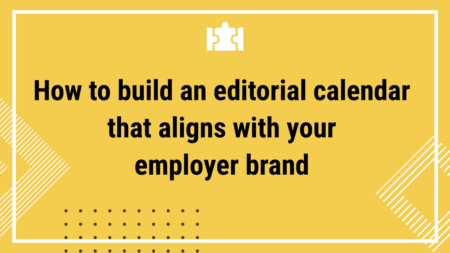Hi, my name is Georgiana. I am the CEO and founder of Beaglecat, and soon you will be listening to Employer Branding: The Inside Podcast. In this podcast, I regularly talk to employer branding managers and acquisition managers, and human resources managers in tech companies in Germany, Romania, and the US. For more content on employer branding-related themes, go to employerbranding.tech or beaglecat.com. Stay tuned!
Overview
We’re back with episode 6 of #Employer Branding: The Inside Podcast! In today’s episode, Aki Friedrich, Director of Learning Experience at Superside, shares valuable #insights on implementing L&D strategies that contribute to business success. Also, we talked about the #purpose of learning and development, and how it can integrate or influence employer branding.
What you’ll learn by listening
- What is learning and development in an organization
- How growth happens when L&D initiatives are put into practice
- Understanding the purpose of L&D for an organization
- How L&D is a sustainable function when it contributes to business success
- L&D on a budget: how can smaller organizations implement an L&D strategy
- Basic tips managers can use to implement L&D strategies in their organizations
- Challenges associated with creating clear career paths
- How does Learning and Development integrate or influence Employer Branding
About Superside
Superside is the leading Creative-as-a-Service (CaaS) company that helps over 450 ambitious brands get great design and creative done at scale. With our design subscription service, marketing and creative teams can unbottleneck design, move faster and drive more reliable creative performance. We help the world’s leading companies like Google, Meta, Amazon, Salesforce, Red Bull and Boston Consulting Group with advertising creative, brand design, video production and more. No longer chained to over-taxed in-house creative teams, our customers reduce costs and move quickly with infinite scale.
Podcast link – Enjoy listening on Spotify!
Podcast transcription – Employer Branding T.I.P S07Ep.06
Georgiana:
Hello, everyone, here we are with a new episode of Employer Branding: The Inside Podcast. And today we are talking about employer branding in the context of learning and development, which is a direction I only tackled at the beginning of this podcast and haven’t really spoken about it since. Which is why I’m super happy to be greeting Aki Friedrich, who is one of the best specialists that I’ve ever met on the topic. Welcome, Aki, thank you so much for accepting to talk to me today.
Aki Friedrich:
Thanks for having me.
Georgiana:
Aki has worked with Taxfix for quite a while for I think, a bit longer than two years. And now he’s helping others succeed at Superside. But please tell us a little bit about what your role involves in learning and development.
Aki Friedrich:
Yeah, yeah, sure. So hi, again, I’m Aki. And yeah, thanks for your kind words, as well. I’m working in learning and development, as you said. I’ve done so in different companies of different sizes, you mentioned a few. And currently, I’m a director of the learning experience at Superside. It’s a wonderful company that offers creative services. And before that, I worked at another scale-up that you also mentioned Taxfix, two and a half years, where I built the learning function from scratch. And before that, I was at Apple retail for seven years. So you know, really long time and very different functions.
But I’m actually a musician by training, and I have a creative background myself. So I have done a few changes in my career as well. And yeah, I would say that’s it in a nutshell and my role and compasses building the learning function from scratch, basically, right. So building a learning environment, and enabling people to learn, it has connections to career development, as well. And all of the topics that come with it.
Georgiana:
You know, Aki, I’m originally from Romania, and I’m in my hometown Iasi, currently, which is Romania, second biggest city. And yesterday evening, I was invited by one of my former students, I used to be a teacher at the university a while ago, to attend a seminar about employer branding, and creating an EVP; and at some point, diversity and inclusion was one of the topics we discussed. And then we spoke about learning and development. And to me, it was such a change.
And it was such a new topic. And it made me think you guys, you are so lucky to be approaching these topics. 15 years ago, while I was studying, and I also studied abroad, okay, so not just in Romania. These were topics that nobody was mentioning. Nobody had any clue what they meant. So, you know, this brings me to my first question, which may sound silly in a way, but still, I want you to answer it. Why is learning and development important in an organization?
Aki Friedrich:
Yeah, I don’t think it’s a silly question. And it’s really, you know, we need to answer it again, I guess. And I think it can do different things in organizations, and you can look at it from different angles as well. And I think one angle is personal growth, which seems to be the big one of our time, or at least, you know, of the last years. And it relates to employee retention and how people grow, for example. And building skills is another thing. So can you build skills really in a targeted manner.
And it can also play really business-centric roles, creating training that helps achieving business results, basically, right? Which could be, for example, if you have somebody in sales, who needs to position a product more effectively, or if you have somebody who needs to address concerns in a different way, you can train people with really specific skills on something, and really being very close to the business, which I think is an important role as well. Sorry, I think it’s a field. You know, it’s kind of very popular, as you mentioned, like it’s mentioned a lot. It’s kind of in everybody’s head at the same time.
I think sometimes it’s a bit blurry, what it can do, and it’s really important to define this and really begin the discussion when you come into a company and think about what should it do for the company because it can do different things. But I think the two big ones that I can think of right now is employee retention. So basically, you know, if you offer something that’s really beneficial for people, they feel they can grow in the company, they will stay longer. It’s that simple. But also achieving business goals, like helping businesses achieving business goals.
Georgiana:
And you know what the situation looks like at the moment for employer branding. I was part of the layoffs in December. And I see that still companies are either not hiring in this role, or they are firing their employer branding managers. So they think they can do without. I’m not going to talk about what’s going to happen when the market takes off again.
I think, okay, maybe let’s say from one perspective, I could maybe understand that they don’t have the budget, although you don’t need a huge budget for employer branding. They can exist without it, let’s say, you know, in a world that’s, you know, oriented towards the basic needs. But I think without learning and development, no company can grow; no company can become sustainable. It’s clear and clear, people are going to leave you if you don’t have a clear career path, if you don’t train them, you know. But I’m wondering how many companies share this perspective.
Aki Friedrich:
Yeah. I can talk from my perspective, and I was lucky enough that the companies that I worked in, they did promote learning and development heavily and acknowledge that it’s an important function. I think traditionally, if you look at the scaleup environment, or the startup environment, it’s very present. People are really aware, I think what happens sometimes is that there’s a consensus that learning is important, but not a lot of people know why and how it contributes to a company’s success, which can lead to a lot of confusion and makes it blurry sometimes.
And that’s why I think and I mentioned it before, I think we need to challenge senior leadership and senior leaders to think about what the learning function can do for a company in the end, and what they expect from it as well, right, and become really specific about that. And I’ve done that a few times, as you can imagine, in my career; challenging people to think about that about the intended outcome. And I’ve seen quite some question marks in people’s eyes, and even, very tenured leaders that are usually very results-driven, very outcome focused; they don’t have great answers to this. And so it seems hard for people to wrap their minds around this.
And it’s understandable, but I think we need to have this discussion first. But generally speaking, ultimately, to your question, I think the companies that I worked in, they have very top of mind. At the same time, it’s not always very clear what role learning and development plays. And it can mean very different things in different companies.
Georgiana:
Indeed, you’re right. And I think about friends and colleagues from my generation of students, who are currently in HR and who are currently initiating roles for learning and development in big organizations in Bucharest, for example. So it is beginning to take off. But I’m wondering, your role is somehow in the middle, right? So you have to serve leadership and the business objectives. And at the same time, you need to think of what the employees need to learn. And maybe I don’t know, their personal passions and hobbies sometimes. So what are the purposes in the end of the day of our learning and development?
Aki Friedrich:
Yeah, yeah. It’s a great question. And I think I wouldn’t look at it from separate things. I think both are connected, like being employee-centric and business oriented at the same time, I think both work hand in hand. So I think in the end, the answer is that we need both, we need a mix of both. But more extensive answer might be that. I mean, we can never forget that businesses are built off people, right? So without listening to people and taking care of people’s needs, there is no way of succeeding.
No way. But I believe we also need to start more often with the business in mind and you know, being really business-centric, to understand how learning and development can contribute to the business success. And why do I say it that way? Because I think it’s important to acknowledge that businesses can’t exist without business success. Business success can also mean people staying longer with a company, meaning, if you add value for them, then they stay long, longer.
That’s usually good for business, in most cases, at least. But if L&D doesn’t contribute to business success, then it’s not a sustainable function. And we can’t afford not to be a sustainable function in the end, because we will become obsolete. And it might sound harsh, being that clear. But I’ve seen a lot is the notion that L&D is something only to make people happy or think of it as a benefit or nice to have. And that creates this notion that it’s a nice to have and not a business necessity, which I think it is not. I think it can help businesses a lot in succeeding and achieving goals. And I think it’s so important to make that clear.
Georgiana:
Absolutely. And if we were to imagine learning and development in startups, okay, smaller companies where resources are very scarce or budgets are being cut all the time. How can these leaders think about learning and development?
Aki Friedrich:
I would say think small is a really good starting point, think about learning principles more than learning content. And don’t think about learning as a separate activity, like embedded right? It’s not something external, it’s not something you should outsource. And I can elaborate a bit on that. Most of the time, when we talk about learning and development, we think about resources and training and online courses and books and so on; so kind of knowledge. But I don’t think that’s the primary problem of our time. We have more resources than we can ever consume.
Curation might be a problem, like finding the right resources. But we have high quality resources. And often they are for free, you know, all big universities post courses online. Basically, on every skill that I can think of, there’s a tutorial on YouTube or context around it, and so on. The question is, how can we take knowledge and turn it into a skill? And how can we do that within super busy working environments? Right. So that’s, that’s the tricky thing. And I think the best way to do this is to embed learning in everything that we do in the end; and not thinking about it, you know, now I’m going into a training event, and then I come out of it. And then I’ve learned, but rather thinking about it, how can I learn along the way, and I have a small example, how I do this. And that’s in my one-on-ones with my team.
I have a section in my one-on-ones where I ask: What is one thing that you’ve learned last week? It’s such a simple question, right? It’s a learning extraction, basically becoming aware of something that you’ve done. And you know, the things we learn all the time, usually, and usually we know how to find good resources, when we miss knowledge, but we often miss reflecting on learnings, and then we miss practice. Because this is, in the end how we build a skill, right? We don’t build it by reading a book. And I’ve seen a lot of people who know a lot of stuff about something, but they don’t have the skill. I mean, how many people do know about coaching, but they’re not really good coaches, right?
There’s millions of people. That’s so important. And by asking simple questions like this regularly, you can help people reflect and understand how well they did something. And also understand, was it a success? Did I fail on something, and then they can adjust and you know, use it again in the future, or do it differently and so on. But I feel, sensemaking, reflection, all of these things are so underrated and learning and development, and it doesn’t need a lot of resources to do that. It’s more a habit for leadership. And it’s about how can I embed this in things that we already have, like performance conversations, for example, right? What role does learning and development play here. And it’s a really small example that I told you about the hopefully really easy to apply. But I think it’s so important not to think of it as something that you go and do. And then you come back and you have learned, but rather, it’s on the job. It’s why you have conversations, while you have feedback conversations, while you have coaching conversations, and so on.
Georgiana:
I think you’re totally right, because nowadays, it’s so easy to get a diploma for absolutely anything. You’ve got LinkedIn courses, you’ve got Udemy, all the big universities, like you said they offer learning material for everything. The question is, how do you apply it in your organization?
Aki Friedrich:
And it’s different for you and me, right? So we might learn the same skill. But in our context, it might seem something different. So the way you use it, the way you need to use it in the end might be different, although it sounds like it’s the same thing we do.
Georgiana:
And it’s such a simple question, you know, just having this question within the team once a week and trying to reflect on what you’ve learned. This is mind-blowing; so easy to implement. And it’s such important results. And, you know, I’m thinking now that in IT, because we work a lot with companies in IT, and I was part of tech organizations. There’s always concern for improving skills for developers. Absolutely. Always they need to their their programming levels, or they need to switch from one technology to the other all the time. But for people in employer branding, for example, or in marketing, not so much. Why this huge difference between them?
Aki Friedrich:
I think it’s more obvious. And obviously, the development in technical roles is really quick still, I mean, the kind of pace of how programming languages are being developed is extremely high. And it’s much more tangible. So when you don’t have the skill of programming a certain language, it’s very obvious you can’t do it. When you don’t have the skill of addressing difficult problems in conversations, then it might show but it’s not something that is so obvious, right? So I think sometimes it’s just more tangible. But I agree, it’s a very obvious thing. And by the way, usually, technical departments have very good approaches to learning and development and great communities already how they learn, how they approach it, it’s really impressive.
Georgiana:
And I remember this happening in the tech organizations I’ve known for 15 years. They were learning and reading in groups and exchanging knowledge.
Aki Friedrich:
Yes. I know, communities of practice. Right now, we have fancy labels for this. But at the end, it’s already been there.
Georgiana:
Yeah, indeed. And if we were to, to sum up if possible, all this huge knowledge into just three good tips for any manager willing to implement learning and development strategies in their organizations, what would you advise them?
Aki Friedrich:
Yeah, that’s a big question. I would say, three things that come to mind, really, you know, simple stuff; help people set sensible development goals and follow up on them. So you know, really being conscious about what you want to learn. Because the danger is that there’s obviously 1000s of things that will help us approach. But we kind of need to understand what do I focus on right now? What is helpful in my context, what do I need to learn my role, and so on.
So setting goals with them regularly. And following up. What I’ve seen a lot is they set goals, and then they never talk about it again. But really using your one on ones, using a next development conversation to talk about it. That’s one thing. The other thing, really what I said just before is regularly extract learnings and helping people, you know, because we learn all the time, we sometimes just need to understand? Did it work, well? Can I use this again, and so on. So whenever you can, extract learnings and there’s good examples how teams do this, like in team retros, after sprints, for example.
So there’s a lot of approaches already, but whenever you can ask people and highlight a skill, label it and say, Ah, you know, this is, this was the skill, this is coaching, what you did here is a feedback skill, and so on. So that’s number two. Number three, whenever possible, coach don’t teach; allow people finding answers themselves. It’s a very different thing, learning about something by getting a solution basically, versus finding the solution yourself. And I feel this is where we can improve a lot or generally speaking, this is what happens a lot is that leaders try to provide solutions and help people overcome something by telling them how they would approach it. And it’s not the same thing for everybody. So I’m really asking great questions to help people finding their own solutions.
Georgiana:
Yeah, that’s very valuable, actually. And I’m thinking now about one aspect, which always attracted my attention. And that, for me, will make the difference when joining an organization or not. And that is the career path that the organization offers. And I’ve spoken to many people in human resources, and it’s sort of a very blurry concept. It’s something that people are sometimes scared of. And, you know, I’m wondering, is it that difficult of a process to create a good career path for every employee or for every role in itself?
Aki Friedrich:
Short answer, yes, from experience. You know, it depends if you want to design something kind of contemporary. And, you know, contemporary Career Development Framework, if you want to call it like this, it’s a lengthy process, because you need mature frameworks around it as a precondition, like as an example, like a proper competency framework. And the leveling structure in the company. And you know, this has implications on compensation and other complex areas, which kind of makes it a big thing, because it’s not like drawing one path, which would seem very simple, obviously. And the thing is, I don’t like the term career pathways a lot to be honest, because I think it still stems from this idea that you join in a role. And then there’s a clear pathway where you will go afterwards.
Usually we don’t know and it becomes more uncertain in our times, because there are many more options right now. And, you know, jobs go away, other jobs emerge, people have very clear ideas about what they want to do for a certain time. And then after some time, they have different ideas what to do. And I’ve done the same. I’ve had different roles in my career. And I loved it, I think it’s really cool. But in the end, it’s very hard to expect a clear pathway, it has to be some kind of open framework, and then you need people to support you to navigate this framework. And I remember back at Taxfix, we talked about it as a jungle gym. I don’t know if you know from the playgrounds, this, you know what kids climb, and it’s kind of flexible, it goes in all directions, it goes up and down. It goes, you can do lateral movements in the end, you could you can just sit some time, at a certain position.
And I think it’s a good representation versus the old idea of joining a role and then having this level of seniority and then at some point you arrive, and then you know, it’s get tricky to develop. So I would say it’s a lengthy process. It’s tricky. It’s not impossible. But the tricky thing is to have a really solid competency framework in place, and then enabling managers to help people navigate this basically.
Georgiana:
I like the perspective of being flexible and allowing the employee to see where the company takes him and or her, or whether the role takes them. How does Learning and Development integrate or influence Employer Branding?
Aki Friedrich:
Good question, I could ask it back to you. So in my experience, I mean, it’s really important in talent acquisition, so candidates are looking for development opportunities at companies or something really crucial, that’s my experience, when they apply. They ask for it, they want to know about offers that a company has in that sense. I believe it can have a big impact on talent attraction, and, you know, like, people are just scanning companies for development opportunities. So if there are good opportunities, they usually think of the company in a better or different way.
On the other hand, it tells a lot about the culture of a company, how they grow people, how they support people in developing new skills, and you know, also all this field around; failing, and learning from failure, and so on. It tells us a lot about what values are vivid in a company. And it shapes a lot the picture that I would have of a company, if I, you know, if I’m in an interview and asked people about the company, and how, for example, how they react to failure, and how they make decisions and so on. It gives me a lot of information about what the company is like, how it operates, and how it, you know, kind of what kind of interactions it fosters. And it shapes a lot how I see the company in the end. If I think of Google, for example. It’s such an employer branding advantage for them. The culture is so specific and so kind of famous that it’s for sure, an advantage.
Georgiana:
It is a huge asset. And I think many organizations that have learning and development departments and roles could emphasize it a little bit more and could project it a little bit towards the outside because any person who is willing to learn and to grow with a company is going to be impressed by that. And it’s gonna say, Okay, this organization is interested in my well-being and is interested in my growth and you know, they’re not scared that I might take the growth to a different company for just doing it for me. But unfortunately, they don’t do it. I see it so rarely packaged within the EVP that it’s really a shame.
Aki Friedrich:
I mean, we did a bit at Taxfix, and I think it had quite a nice impact. But yeah, I think yeah, it’s changing you know, because a lot of people are looking for it, I feel it becomes more present. But it also varies depending on the time, how employer-driven the market is or you know, like, what times we will live in basically.
Georgiana:
We’re reaching the end of this discussion, that’s what I’m trying to say. So I’m gonna ask now the final question because we’ve spoken a lot about how organizations see learning and development and how your role is positioned to support employee growth. So I’m wondering now, if we were to take a step back or put ourselves into the employees’ shoes, how can I influence the organization into creating, let’s not say career path system, but into supporting me more?
Aki Friedrich:
I mean, very simply speaking, let the company know there’s a lot of good moments like engagement surveys, you know, people surveys, where you can just let leadership know that this is something you’re looking for. And in my experience, this is something a company reacts to, like at least great companies, they listen to what people are looking for. And it has been a topic as long as I can think, never, you know, not even minding what maturity the career framework had.
But I think it’s something people are always thinking about. And it’s supernatural, because people want to develop and want to kind of progress in any way in their life. So I think, let people know, let the leadership know for sure. Ask for it in your conversations with your managers, I think a big part of career development happens in one on ones and development conversations. It’s not necessarily something so technical. And I think what you also have to adopt as a mindset is, don’t expect a framework to give you a career, because I’ve seen really good frameworks as well. And still, some people struggle at navigating it. Because in the end, what you will need is the drive to explore different positions. You need to understand what skills you would like to develop, what your strengths are, what your weaknesses are, how open to change you are, you know, like it’s also challenging being in new roles; it’s a really tough time sometimes.
And it’s a lot of personal decisions. And I feel we should also educate people to say, if you want to progress, these are the things. And in my former company, we had a workshop, I think it was called a career growth workshop, where you were basically thinking about the skills that you need to develop your career, which I think is super useful. Because in the end, what you need to do is understand what do different positions do, interview people, perhaps, you know, what does the job really look like? Then understand what skills do I need to develop. How can I develop the skills? And I think the best thing a career framework can do is give directions and help you understand how can I move from A to B. But moving you will still have to do yourself are still being really blunt about it. I think that’s also important.
Georgiana:
I think in the end, it’s also a matter of taking your path into your own hands, and just looking to the people around you. I want to transition from this role to that role. How much do I need to learn? What do I need to do to get there? And then yes, if the organization is supportive, I think it could be done. Yeah. It boils down also to the culture of the company,
Aki Friedrich:
Yeah, totally, totally.
Georgiana:
This has been very valuable input. I thank you so much for talking to me today. And I wish you good luck in implementing all those strategies.
Aki Friedrich:
Thank you so much. Let’s talk about it in a few months.






